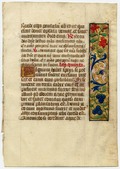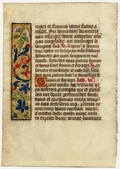Case Western Reserve University Leaf 48
This leaf is from a Dutch Book of Hours from the late fifteenth century. It measures 17.5 x 12.5 cm. Compared to the other specimens of fifteenth-century Books of Hours in the portfolios, this one contains highly "itemized" pages: the red ink used for the rubrications sharply contrasts with the brown ink; several 1- or 2-line initials rendered in gold on a background of blue or red bring light into the text block of most leaves; and many lesser first letters are filled with yellow. Despite this lavish plan, all leaves from this manuscript show evidence of problematic adherence of the gold leaf, and/or incomplete decoration or text. See Denison University Leaf 48 for more information about this manuscript.
Text: This leaf contains text from the Office for the Dead at Matins, the Second or Third Nocturne (largely Job 14).
Reconstruction Note! In Ege's original manuscript, this leaf (probably) followed what is now Leaf 48 in the Rochester Institute of Technology portfolio. (Need to see both sides of the latter to be sure.)
 Case Leaf 48 Recto
Case Leaf 48 Recto
Case Western Reserve University Leaf 48 Recto
 Case Leaf 48 Recto Transcription
Case Leaf 48 Recto Transcription
Recede ergo paululum ab eo, ut quiescat, donec optata veniat, et sicut mercenarii dies eius. R. Ne tradas bestiis animas confitentes tibi. Et animas pauperum tuorum ne obliviscaris in finem. V. Memorare que sit nostra substancia domine et quia non vane consituisti omnes filios hominum . Et animas pauperum tuorum ne obliviscaris in finem. Lectio quinta.
Lignum habet spem si praecisum fuerit rursum virescit et rami eius pullulant. Si senuerit in terra radix eius et in pulvere emortuus fuerit truncus illius. Ad odorem aquae germinabit et faciet comam quasi cum primum plantatum est.
Homo vero cum mortuus fuerit et nudatus atque consumptus ubi quaeso est. Quomodo si recedant aque de
 Case Leaf 48 Recto Translation
Case Leaf 48 Recto Translation
Depart a little from him, that he may rest, until his day wished for, do come, even as of the hireling. R: Deliver not unto beasts the souls confessing to thee. And in the end forget not the souls of thy poor. V. Remember what my substance is for hast thou made all the children of men in vain? Lesson 5.
[Job 14:7-11] A tree hath hope: if it be cut, it growth green again, and the boughs thereof sprout. 8. If its roots be old in the earth, and its stock be dead in the dust: 9. At the scent of water, it shall spring, and bring forth leaves, as when it was first planted. 10. But man when he shall be dead, and stripped and consumed, I pray you where is he? 11. As if the waters should recede...
 Case Leaf 48 Verso
Case Leaf 48 Verso
Case Western Reserve University Leaf 48 Verso
 Case Leaf 48 Verso Transcription
Case Leaf 48 Verso Transcription
mari et fluvius vacuefactus arescat. Sic homo cum dormierit non resurget donec adteratur caelum non evigilabit nec consurget de somno suo. V. Rogamus te domine deus noster ut suscipias animas nostrorum defunctorum pro quibus sanguinem tuum fudisti recordare quia pulvis sumus et homo sicut fenum et flos agri. V. Misericors et miserator et iuste domine. Recordare quia pulvis sumus, et homo sicut fenum et flos agri. Lectio sexta.
Quis mihi hoc tribuat, ut in inferno protegas me, et abscondas me, donec pertranseat furor tuus, et constitutas mihi tempus, in quo recorderis mei? Putas ne mortuus homo rursum vivet? Cunctis diebus, quibus nunc milito, expecto donec veniat immutatio
 Case Leaf 48 Verso Translation
Case Leaf 48 Verso Translation
[continues Job 14:11-12] ...out of the sea, and an emptied river should be dried up; 12. So man when he is fallen asleep shall not rise again; till the heavens be broken, he shall not awake, nor rise up out of his sleep. V. [ ] V. [ ]Lesson 6.
[Job 14] Who will grant me this, that in hell thou protect me, and hide me, till thy fury pass, and appoint me a time, wherein thou wilt remember me? Shall man that is dead, thinkest thou live again? All the days, in which I am now in warfare, I expect until my change do come.